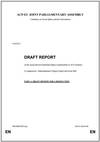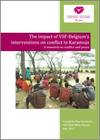Pastoralists require movement across village boundaries to access or share grazing or water resources. They may classify and use land in ways that do not fit easily with government definitions or processes. Grazing is often patchily distributed, and large areas of rangeland with flexible use are required. Pastoralism is an integrated and multiple-use land use systems, which rely upon collective use and management of natural resources by customary institutions. This makes village land use planning (VLUP) processes in rangelands contexts quite challenging.
This document, developed by the Sustainable Rangeland Management Project (SRMP), seeks to suggest improvements to the VLUP process in order to better contribute to sustainable rangeland management. It brings together experience from different organisations and government departments working on VLUP in rangelands areas of Tanzania, as well as relevant lessons from other contexts.
Year of publication: 2013Organization: Coalición Internacional para el Acceso a la Tierra (ILC)
Topic: El conocimiento indígena, Pueblos indígenas, Tierra, Organización, Participación
Language: English
Type of document: Técnico
Geographical coverage: África Oriental
This report documents the findings of a livelihoods assessment carried out as part of the USAID funded Growth, Health and Governance program being implemented by Mercy Corps and partners in the Karamoja sub-region of Northeastern Uganda. The study set out to identify the major opportunities and constraints to production and marketing in the study area and to investigate what productive resources are currently available and how these are being utilized. The study included focus group discussions, participatory exercises, a number of visits to market centers as well as key informant interviews.
Year of publication: 2013Organization: , Agence des États-Unis pour le développement international
Topic: Economía
Language: English
Type of document: Técnico
Geographical coverage: África Oriental
At its meeting of 26 November 2012, the Bureau of the ACP-EU Joint Parliamentary Assembly authorised its Committee on Social Affairs and the Environment to draw up a report, pursuant to Article 2(8) of its Rules of Procedure, on the social and environmental impact of pastoralism in ACP countries.
Year of publication: 2013Organization: Unión Europea (EU)
Topic: Servicios ambientales, Organización
Language: English
Type of document: Técnico, Políticas y legislación
Geographical coverage: Latinoamérica, África Occidental, África Central, África Oriental, África Meridional, Oceanía
This paper reflects on the work of the Ministry of State for Development of Northern Kenya and other Arid Lands between its formation in April 2008 and the elections of March 2013. The paper begins by summarising the historical, political and institutional contexts within which the Ministry was created, as well as the multiple narratives that have driven policy in Kenya’s drylands over time. It explains some of the policy choices the Ministry made in interpreting its mandate and shaping the policy agenda. The paper reflects on the response of different actors to the policy space opened up by the establishment of the Ministry, and looks at how it implemented its mandate and its day-to-day engagement with others. The authors discuss the institutional framework in more detail and the steps required to strengthen it further. The paper concludes with reflections and recommendations.
Year of publication: 2013Organization:
Topic: Economía, Servicios ambientales, Seguridad alimentaria, Organización, Resiliencia
Language: English
Type of document: Científico
Geographical coverage: África Oriental
This briefing paper argues that the erosion of pastoral resource entitlements was hardly a topic for discussion in the early 1980s, but it is the single most critical impediment to contemporary pastoral development. Despite progress on many other fronts, pastoral land rights are under pressure as never before, and the issues of resource governance discussed in this brief are at the crux of the future of pastoral peoples.
The paper presents a comprehensive summary of current challenges to pastoral land rights and resource governance in developing countries. Further, it makes recommendations for managing conflicts and strengthening pastoralists’ rights, and explores the potential role of USAID in addressing these issues.
Year of publication: 2013Organization: Agence des États-Unis pour le développement international
Topic: Conflicto, Tierra, Resiliencia
Language: English
Type of document: Técnico
Geographical coverage: Latinoamérica, Cercano Oriente, Norte de África, África Occidental, África Central, África Oriental, África Meridional, Asia Central, Asia Meridional
This research analyses the conflict situation in Karamoja, Uganda. Its findings are based on community meetings in Moroto and Kaabong Districts, interviews with peace actors, stakeholders, partner organizations, field visits, trainings and literature research. It gives recommendations for conflict sensitive programming and sustainable peace interventions.
Year of publication: 2013Organization: Veterinarios sin fronteras (VSF)
Topic: Conflicto
Language: English
Type of document: Científico
Geographical coverage: África Oriental
This report highlights the importance of pastoralist livestock production for the Sudan's economy, and outlines ways in which pastoralism can be supported in the future. The economic value of pastoral livestock production is largely hidden, both in the official statistics, and in relation to the domestic market and subsistence economy (e.g. milk). The report argues for an informed, effective and equitable integration of pastoral systems within national policy and legal frameworks, in order to legitimize this form of land use and to underpin a more constructive approach to modernization of the livestock sector. The findings indicate that unleashing the potential of the livestock sector in Sudan requires securing the conditions for livestock mobility, so that livestock can access pastures selectively, when the nutritional value of plants is at their peak. This requires the return of security in pastoral areas and along livestock routes, and a regulation of markets in land (in pastoral areas), water for livestock, and crop residues.
Year of publication: 2013Organization:
Topic: Economía, Tierra, Valeur ajoutée
Language: English
Type of document: Técnico, Científico
Geographical coverage: África Oriental
See how members of arbale pastoral field school in Borana Zone, Southern Ethiopia are applying knowledge gained to implementing community managed disaster risk reduction action plans for the protection of vast areas of communal grazing lands.
Year of publication: 2013Organization: Organización de las Naciones Unidas para la Alimentación y la Agricultura (FAO)
Topic: Organización, Servicios sociales
Language: English
Type of document: Videos
Geographical coverage: África Oriental









